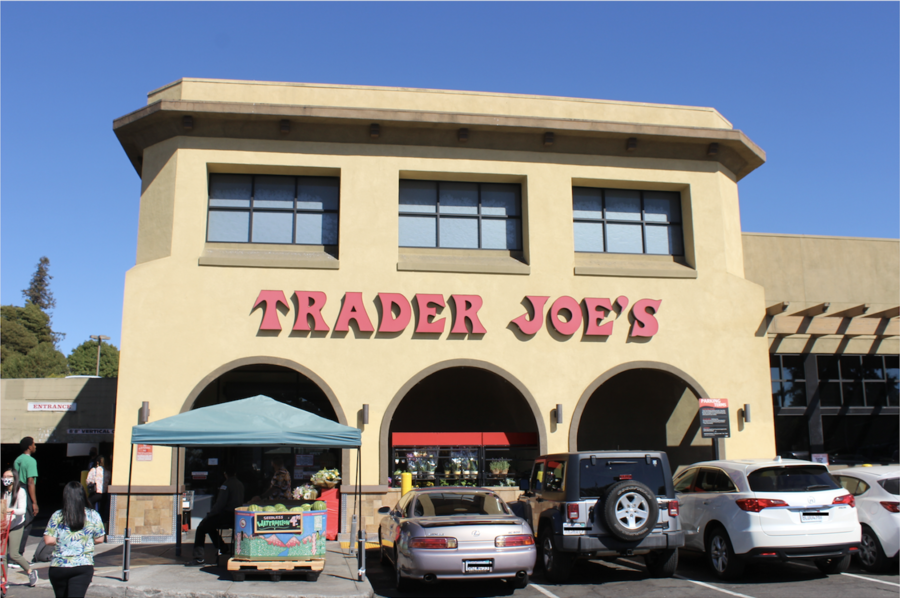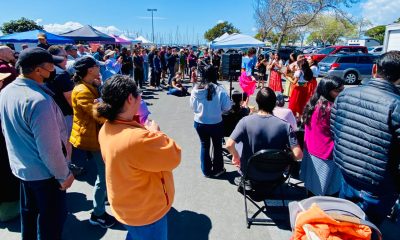Bay Area
Large Grocery Stores End Hazard Pay in Oakland, Berkeley
Immediately after Oakland and Berkeley reached the yellow tier of COVID-19 spread, as state restrictions like capacity limits lifted, and as the Delta variant continued to spread, positive cases of the virus began to trend upward. A chart showing data collected by Alameda County shows that when the county entered the yellow tier on June 8, the total cases from the previous 14 days was 455. Toward the end of July, this 14-day total passed 4,000 cases on three consecutive days, which was about a ninefold increase.

Workers in four different chain grocery stores in Oakland, Berkeley and Emeryville told The Oakland Post that they are not receiving hazard pay related to the COVID-19 pandemic.
While Oakland and Berkeley city councils each unanimously passed ordinances last February that required large grocery stores to pay workers an additional $5 per hour due to COVID-19 hazards, both ordinances stated that once the cities reached the yellow tier — that indicating minimal COVID-19 spread — this requirement would end.
Workers in Whole Foods, Grocery Outlet and Trader Joe’s based in either Oakland or Berkeley reported that they received their last hazard paychecks in early July, about a month after these cities reached the yellow tier on June 8.
The Oakland Post contacted Oakland City Council President Nikki Fortunato Bas, who wrote The Grocery Store Worker Hazard Pay Emergency Ordinance, to ask about hazard pay ending. Bas’s chief of staff, Miya Saika Chen responded by acknowledging that since the ordinance “was tied to state guidelines determining safe reopening,” and Oakland had reached the yellow tier, the ordinance no longer applies.
Immediately after Oakland and Berkeley reached the yellow tier of COVID-19 spread, as state restrictions like capacity limits lifted, and as the Delta variant continued to spread, positive cases of the virus began to trend upward. A chart showing data collected by Alameda County shows that when the county entered the yellow tier on June 8, the total cases from the previous 14 days was 455. Toward the end of July, this 14-day total passed 4,000 cases on three consecutive days, which was about a ninefold increase.
In response to questions about hazard pay ending as COVID-19 cases increased, Chen emphasized the impact of vaccination, as vaccines have been effective in preventing serious health effects related to the virus.
“Our top priority must be to ensure everyone has accurate information about the vaccines and safe and equitable access to the vaccines in order to prevent another wave of infections,” she said.
Neither Bas nor any members her staff responded when asked if there was anything council could do or is planning to do to reinstate grocery store hazard pay. The Oakland Post posed the same question to Berkeley City Councilmember Terry Taplin, who wrote Berkeley’s hazard pay ordinance. He responded by saying that to reinstate grocery store hazard pay, Berkeley’s City Council would have to pass a new ordinance.
“The city is currently evaluating several options to respond to the Delta variant,” Taplin said. “I will have to consult with the city team and legal to discuss what can be done around new hazard pay.”
In Oakland and Berkeley, new hazard pay ordinances cannot be passed this month through City Council actions, as council meetings in both cities are on hold through August. But both Oakland and Berkeley City Councils could revisit the issue in September when meetings start up again. The grocery store workers who The Oakland Post spoke to felt they deserved hazard pay due to their hard work during the COVID-19 pandemic.
“[The hazard pay] was so helpful,” said a Whole Foods worker in Berkeley. “It’s so expensive to live here and I can barely make it. I was able to put a little money away and not penny-pinch when I was getting it.”
Like all workers interviewed for this article, this worker feared retaliation from their employers for speaking to the press about their pay, and asked not to be named.
Furthermore, with temperature checks suspended, the Berkeley Whole Foods worker said they did not feel safe at work. They also claimed that in May there was an outbreak of the virus in the prepared foods section of their store. Although The Oakland Post contacted Whole Foods to ask about hazard pay, temperature checks, and the alleged COVID-19 outbreak, their media team has not responded.
The City of Emeryville, which borders both Oakland and Berkeley, has never required any grocery stores to offer its employees COVID-19 hazard pay. A worker at a Pak ’N Save in Emeryville, who has been on the job for about a year, said they were being paid Emeryville’s minimum wage, which is currently $17.13, and has never received any hazard pay. They said low pay has hit some of their co-workers with families especially hard. Children sometimes wait in the Pak ’N Save break room during shifts as the pay rates make it impossible for some grocery store workers to afford childcare.
“They are paying us the lowest they are literally allowed to pay us,” the Pak ’N Save worker said. “A lot of people are sick of it. A lot of people are quitting.”
Wendy Gutshall, a spokesperson for Safeway, the company that owns and operates Pak ’N Save, confirmed that the Emeryville store has not been paying hazard pay and that Safeway stores in Oakland and Berkeley stopped paying the $5 hazard pay after those cities reached the yellow tier. Gutshall said Safeway and Pak ’N Save paid workers an extra $2 an hour in hazard pay from March through June 13 of 2020 and gave a bonus to their frontline workers last December.
Although they have not currently been receiving hazard pay, workers at Pak ’N Save in Emeryville have faced exposure to COVID-19. Emails this Pak ’N Save worker shared with The Oakland Post from a Regional Human Resources Manager indicate that between July 21 and July 28, workers had been exposed to COVID-19 three separate times in the store.
This same worker shared a photo of a letter the store displayed in its break room indicating that one of their co-workers recently filed a complaint with State of California’s Dept. of Industrial Relations accusing the store of making them work for several days after they reported experiencing COVID-19 symptoms due to the store being short staffed.
When asked about the complaint, Gutshall said she could not speak to it directly, stating “For privacy reasons, we cannot provide specifics regarding a [worker’s] situation.” She said workers experiencing COVID-19 symptoms are instructed to go home, that the company is in close contact with such workers to investigate their contacts with other workers and ensure they receive appropriate medical care, and that such workers can access 80 hours of quarantine pay.
According to Gutshall, workers are required to check their temperature when reporting for work at Pak ’N Save and Safeway. The Pak ’N Save worker The Oakland Post interviewed said such temperature checks are optional at the store where they worked.
Both the Pak ’N Save worker and the Whole Foods worker that The Oakland Post interviewed said that as the pandemic has dragged on, increasing numbers of their co-workers have quit, which has caused their workload to intensify and increase.
“Everyone has to do a little bit of everything,” the Pak ’N Save worker said. “We don’t have enough checkers or enough people who walk around the store to help customers and clean up. But [Pak ‘’N Save] is not even willing to increase wages to meet the need for labor.”
“The work is just getting more and more stressful,” said the Whole Foods worker. “We’re running on a skeleton crew. And now we’re back to regular pay.”
Alameda County
DA Pamela Price Stands by Mom Who Lost Son to Gun Violence in Oakland
Last week, The Post published a photo showing Alameda County District Attorney Pamela Price with Carol Jones, whose son, Patrick DeMarco Scott, was gunned down by an unknown assailant in 2018.

Publisher’s note: Last week, The Post published a photo showing Alameda County District Attorney Pamela Price with Carol Jones, whose son, Patrick DeMarco Scott, was gunned down by an unknown assailant in 2018. The photo was too small for readers to see where the women were and what they were doing. Here we show Price and Jones as they complete a walk in memory of Scott. For more information and to contribute, please contact Carol Jones at 510-978-5517 at morefoundation.help@gmail.com. Courtesy photo.
Bay Area
State Controller Malia Cohen Keynote Speaker at S.F. Wealth Conference
California State Controller Malia Cohen delivered the keynote speech to over 50 business women at the Black Wealth Brunch held on March 28 at the War Memorial and Performing Arts Center at 301 Van Ness Ave. in San Francisco. The Enterprising Women Networking SF Chapter of the American Business Women’s Association (ABWA) hosted the Green Room event to launch its platform designed to close the racial wealth gap in Black and Brown communities.

By Carla Thomas
California State Controller Malia Cohen delivered the keynote speech to over 50 business women at the Black Wealth Brunch held on March 28 at the War Memorial and Performing Arts Center at 301 Van Ness Ave. in San Francisco.
The Enterprising Women Networking SF Chapter of the American Business Women’s Association (ABWA) hosted the Green Room event to launch its platform designed to close the racial wealth gap in Black and Brown communities.
“Our goal is to educate Black and Brown families in the masses about financial wellness, wealth building, and how to protect and preserve wealth,” said ABWA San Francisco Chapter President LaRonda Smith.
ABWA’s mission is to bring together businesswomen of diverse occupations and provide opportunities for them to help themselves and others grow personally and professionally through leadership, education, networking support, and national recognition.
“This day is about recognizing influential women, hearing from an accomplished woman as our keynote speaker and allowing women to come together as powerful people,” said ABWA SF Chapter Vice President Velma Landers.
More than 60 attendees dined on the culinary delights of Chef Sharon Lee of The Spot catering, which included a full soul food brunch of skewered shrimp, chicken, blackened salmon, and mac and cheese.
Cohen discussed the many economic disparities women and people of color face. From pay equity to financial literacy, Cohen shared not only statistics, but was excited about a new solution in motion which entailed partnering with Californians for Financial Education.
“I want everyone to reach their full potential,” she said. “Just a few weeks ago in Sacramento, I partnered with an organization, Californians for Financial Education.
“We gathered 990 signatures and submitted it to the [California] Secretary of State to get an initiative on the ballot that guarantees personal finance courses for every public school kid in the state of California.
“Every California student deserves an equal opportunity to learn about filing taxes, interest rates, budgets, and understanding the impact of credit scores. The way we begin to do that is to teach it,” Cohen said.
By equipping students with information, Cohen hopes to close the financial wealth gap, and give everyone an opportunity to reach their full financial potential. “They have to first be equipped with the information and education is the key. Then all we need are opportunities to step into spaces and places of power.”
Cohen went on to share that in her own upbringing, she was not guided on financial principles that could jump start her finances. “Communities of color don’t have the same information and I don’t know about you, but I did not grow up listening to my parents discussing their assets, their investments, and diversifying their portfolio. This is the kind of nomenclature and language we are trying to introduce to our future generations so we can pivot from a life of poverty so we can pivot away and never return to poverty.”
Cohen urged audience members to pass the initiative on the November 2024 ballot.
“When we come together as women, uplift women, and support women, we all win. By networking and learning together, we can continue to build generational wealth,” said Landers. “Passing a powerful initiative will ensure the next generation of California students will be empowered to make more informed financial decisions, decisions that will last them a lifetime.”
Bay Area
MAYOR BREED ANNOUNCES $53 MILLION FEDERAL GRANT FOR SAN FRANCISCO’S HOMELESS PROGRAMS
San Francisco, CA – Mayor London N. Breed today announced that the U.S. Department of Housing and Urban Development (HUD) has awarded the city a $53.7 million grant to support efforts to renew and expand critical services and housing for people experiencing homelessness in San Francisco.

FOR IMMEDIATE RELEASE:
Wednesday, January 31, 2024
Contact: Mayor’s Office of Communications, mayorspressoffice@sfgov.org
***PRESS RELEASE***
MAYOR BREED ANNOUNCES $53 MILLION FEDERAL GRANT FOR SAN FRANCISCO’S HOMELESS PROGRAMS
HUD’s Continuum of Care grant will support the City’s range of critical services and programs, including permanent supportive housing, rapid re-housing, and improved access to housing for survivors of domestic violence
San Francisco, CA – Mayor London N. Breed today announced that the U.S. Department of Housing and Urban Development (HUD) has awarded the city a $53.7 million grant to support efforts to renew and expand critical services and housing for people experiencing homelessness in San Francisco.
HUD’s Continuum of Care (CoC) program is designed to support local programs with the goal of ending homelessness for individuals, families, and Transitional Age Youth.
This funding supports the city’s ongoing efforts that have helped more than 15,000 people exit homelessness since 2018 through City programs including direct housing placements and relocation assistance. During that time San Francisco has also increased housing slots by 50%. San Francisco has the most permanent supportive housing of any county in the Bay Area, and the second most slots per capita than any city in the country.
“In San Francisco, we have worked aggressively to increase housing, shelter, and services for people experiencing homelessness, and we are building on these efforts every day,” said Mayor London Breed. “Every day our encampment outreach workers are going out to bring people indoors and our City workers are connecting people to housing and shelter. This support from the federal government is critical and will allow us to serve people in need and address encampments in our neighborhoods.”
The funding towards supporting the renewal projects in San Francisco include financial support for a mix of permanent supportive housing, rapid re-housing, and transitional housing projects. In addition, the CoC award will support Coordinated Entry projects to centralize the City’s various efforts to address homelessness. This includes $2.1 million in funding for the Coordinated Entry system to improve access to housing for youth and survivors of domestic violence.
“This is a good day for San Francisco,” said Shireen McSpadden, executive director of the Department of Homelessness and Supportive Housing. “HUD’s Continuum of Care funding provides vital resources to a diversity of programs and projects that have helped people to stabilize in our community. This funding is a testament to our work and the work of our nonprofit partners.”
The 2024 Continuum of Care Renewal Awards Include:
- $42.2 million for 29 renewal PSH projects that serve chronically homeless, veterans, and youth
- $318,000 for one new PSH project, which will provide 98 affordable homes for low-income seniors in the Richmond District
- $445,00 for one Transitional Housing (TH) project serving youth
- $6.4 million dedicated to four Rapid Rehousing (RRH) projects that serve families, youth, and survivors of domestic violence
- $750,00 for two Homeless Management Information System (HMIS) projects
- $2.1 million for three Coordinated Entry projects that serve families, youth, chronically homeless, and survivors of domestic violence
In addition, the 2023 CoC Planning Grant, now increased to $1,500,000 from $1,250,000, was also approved. Planning grants are submitted non-competitively and may be used to carry out the duties of operating a CoC, such as system evaluation and planning, monitoring, project and system performance improvement, providing trainings, partner collaborations, and conducting the PIT Count.
“We are very appreciative of HUD’s support in fulfilling our funding request for these critically important projects for San Francisco that help so many people trying to exit homelessness,” said Del Seymour, co-chair of the Local Homeless Coordinating Board. “This funding will make a real difference to people seeking services and support in their journey out of homelessness.”
In comparison to last year’s competition, this represents a $770,000 increase in funding, due to a new PSH project that was funded, an increase in some unit type Fair Market Rents (FMRs) and the larger CoC Planning Grant. In a year where more projects had to compete nationally against other communities, this represents a significant increase.
Nationally, HUD awarded nearly $3.16 billion for over 7,000 local homeless housing and service programs including new projects and renewals across the United States.
-

 Activism4 weeks ago
Activism4 weeks agoOakland Post: Week of March 27 – April 2, 2024
-

 #NNPA BlackPress4 weeks ago
#NNPA BlackPress4 weeks agoCOMMENTARY: D.C. Crime Bill Fails to Address Root Causes of Violence and Incarceration
-

 #NNPA BlackPress4 weeks ago
#NNPA BlackPress4 weeks agoFrom Raids to Revelations: The Dark Turn in Sean ‘Diddy’ Combs’ Saga
-

 #NNPA BlackPress4 weeks ago
#NNPA BlackPress4 weeks agoCOMMENTARY: Lady Day and The Lights!
-

 #NNPA BlackPress4 weeks ago
#NNPA BlackPress4 weeks agoMayor, City Council President React to May 31 Closing of Birmingham-Southern College
-

 #NNPA BlackPress4 weeks ago
#NNPA BlackPress4 weeks agoBaltimore Key Bridge Catastrophe: A City’s Heartbreak and a Nation’s Alarm
-

 #NNPA BlackPress4 weeks ago
#NNPA BlackPress4 weeks agoBaltimore’s Key Bridge Struck by Ship, Collapses into Water
-

 #NNPA BlackPress4 weeks ago
#NNPA BlackPress4 weeks agoBeloved Actor and Activist Louis Cameron Gossett Jr. Dies at 87



















































